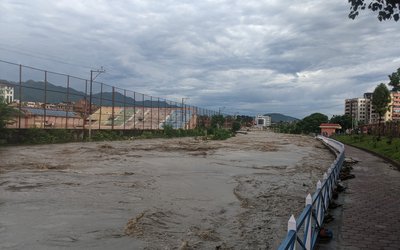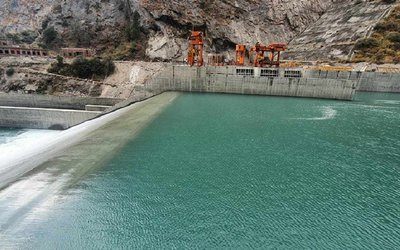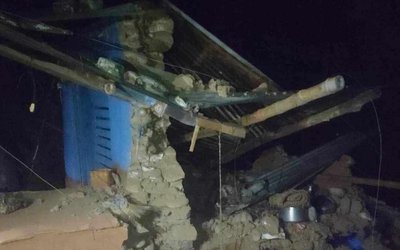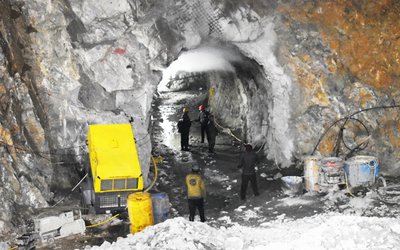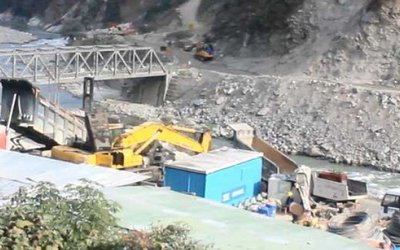
The meeting of Nepal-India energy Joint Steering Committee (JSC) has made a major breakthrough agreeing to a modality for Butwal-Gorakhpur 400 kV Cross border Transmission Line. According to an agreement, Nepal and India will have equal share of 50/50 percent in the transmission line.
This agreement paves the way to construct the much talked Butwal Gorakhpur Cross border Transmission line.
Prior to the JSC meeting, the joint secretary-level Joint Working Group (JWG) meeting was held and finalizes the agendas for the JSC meeting. Prabin Aryal, joint secretary of Ministry of Energy, Water Resources and Irrigation, led Nepali team.
For the last few years, Nepal has been pressing India to start work on Butwal-Gorakhpur Transmission line. However, both the sides failed to reach amicable agreement on the issue.
“This is a historic agreement and major breakthrough in the negotiation between Nepal and India,” said Dinesh Ghimire, Secretary of Energy, Water Resources and Irrigation and head of the Nepalese delegation. “Since Nepal and India both have already developed a modality in Cross border transmission line in Dhalkebar Mujafarpur, we have decided to follow a model,” secretary Ghimire told to New Spotlight.
Similarly, Nepal and India also agreed on energy banking project. The two day secretary level meetings have concluded in Southern Indian city of Bangalore.
Dinesh Kumar Ghimire, secretary at the Ministry of Energy, Water Resources and Irrigation (MoEWRI), led Nepali delegation, whereas his counterpart Subhash Chandra Garg is heading the Indian team.
Aryal, joint secretary at MoEWRI, who was a participant in the discussions, said that the secretary-level talks agreed on the agenda prepared by their meeting ealier.
The New Butwal-Gorakhpur cross-border transmission line project is a must to implement the US government’s Millennium Challenge Corporation assistance to Nepal, according to Aryal.
“Government authorities from both sides have spent a lot of time preparing the groundwork for the agreement and we hope it will be finalized this time.”
Aryal informed that there has been agreement to construct the transmission line on government-to-government modality and the detailed project report has also already been finalized.
The cross-border transmission line project has been under discussion for a long time and the issue was also raised during the last JSC meeting in Pokhara on January 23. Back then, Nepal and India had agreed to sell more electricity to Nepal. Similarly, at the Pokhara meeting, both the governments had agreed to build the respective length of the transmission line that falls in their territory.
Of the total 140-km-long transmission line, 20 km falls in Nepal’s territory and remaining 120 km lies in the Indian territory. Moreover, Nepal had pledged to invest 50 per cent of equity in the Indian side of the transmission line. At that meeting, Nepal had also agreed to pay cent per cent wheeling charge for seven years from the beginning of the transmission line operation.
After seven years of operation, Nepal has proposed that both countries must pay according to the quantum of energy used through this transmission line. However, India had refused to accept that proposal.
During the last meeting in January, Nepal and India had discussed opening a joint company to implement the project and there were also talks on India providing interest-free loan to fund the construction works. The meeting, however, did not make any agreement.
- Weather Forecast: Partly To Generally Cloudy With Rain And Thunder Acrosss Nepal
- Apr 19, 2025
- Minister Dahal Directed To Complete The Dannune Portion Of Road Before Monsoon
- Apr 18, 2025
- Kanchenjunga Diamond Festival Being Celebrated From Today To Mark The 70th Anniversary Of The First Successful Ascent
- Apr 18, 2025
- RPP To Hold Protest In Restricted Areas Of Kathmandu On April 20
- Apr 18, 2025
- Weather Forecast: Partly Cloudy With Rain And Thunder In Kathmandu, Pokhara, Biratnagar And Janakpur
- Apr 18, 2025
